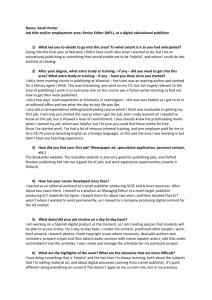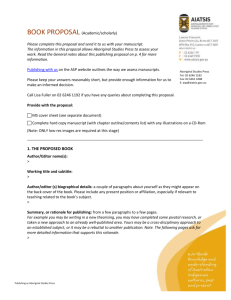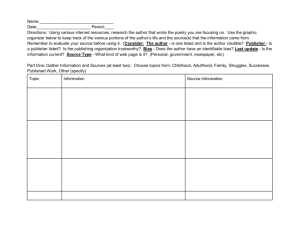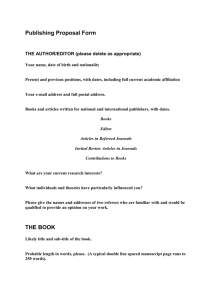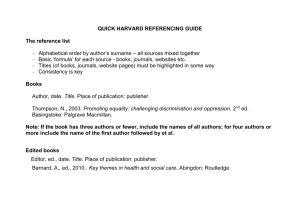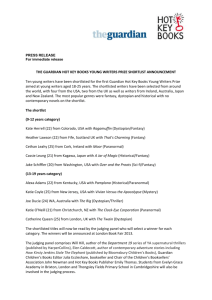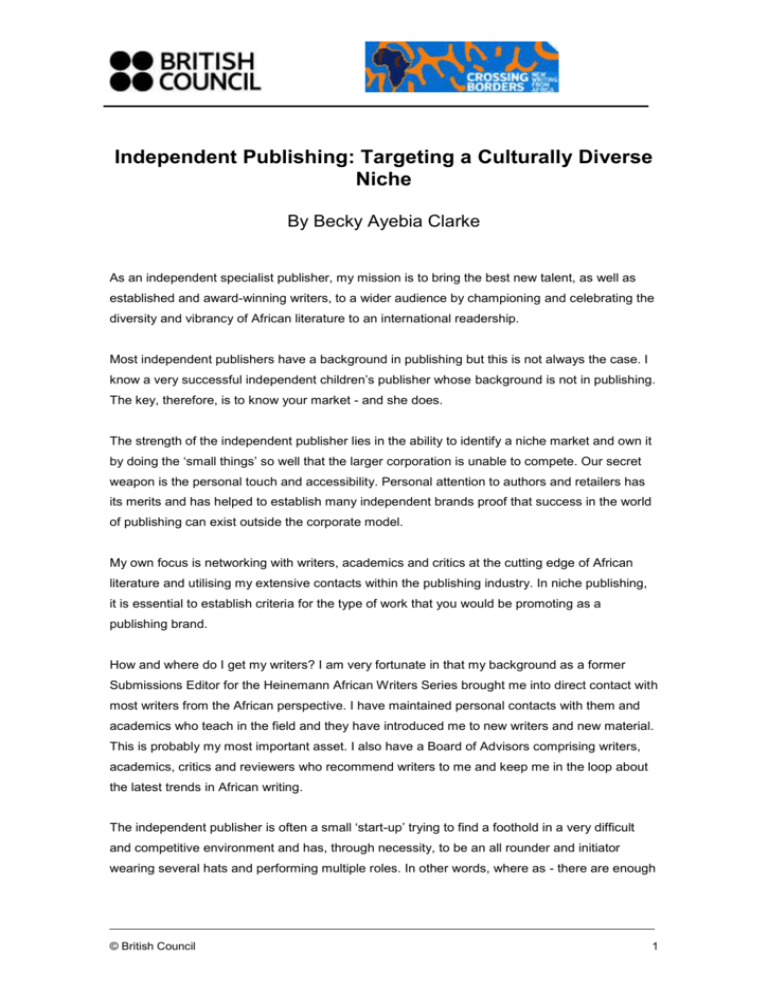
Independent Publishing: Targeting a Culturally Diverse
Niche
By Becky Ayebia Clarke
As an independent specialist publisher, my mission is to bring the best new talent, as well as
established and award-winning writers, to a wider audience by championing and celebrating the
diversity and vibrancy of African literature to an international readership.
Most independent publishers have a background in publishing but this is not always the case. I
know a very successful independent children’s publisher whose background is not in publishing.
The key, therefore, is to know your market - and she does.
The strength of the independent publisher lies in the ability to identify a niche market and own it
by doing the ‘small things’ so well that the larger corporation is unable to compete. Our secret
weapon is the personal touch and accessibility. Personal attention to authors and retailers has
its merits and has helped to establish many independent brands proof that success in the world
of publishing can exist outside the corporate model.
My own focus is networking with writers, academics and critics at the cutting edge of African
literature and utilising my extensive contacts within the publishing industry. In niche publishing,
it is essential to establish criteria for the type of work that you would be promoting as a
publishing brand.
How and where do I get my writers? I am very fortunate in that my background as a former
Submissions Editor for the Heinemann African Writers Series brought me into direct contact with
most writers from the African perspective. I have maintained personal contacts with them and
academics who teach in the field and they have introduced me to new writers and new material.
This is probably my most important asset. I also have a Board of Advisors comprising writers,
academics, critics and reviewers who recommend writers to me and keep me in the loop about
the latest trends in African writing.
The independent publisher is often a small ‘start-up’ trying to find a foothold in a very difficult
and competitive environment and has, through necessity, to be an all rounder and initiator
wearing several hats and performing multiple roles. In other words, where as - there are enough
© British Council
1
hands in the corporate environment to allow specialisation in specific aspects of the publishing
discipline, the independent enterprise enjoys no such luxury and is required to perform all the
roles involved in managing projects from beginning to end.
The process begins with the author who has an idea for a story and has produced a manuscript
but is not quite sure whether it is publishable and seeks help by submitting it either through an
agent or directly to the submissions editor/publisher. The publisher’s role is then to decide
whether the manuscript fits their criteria, is publishable and may even at this early stage give
some consideration as to its marketability. The selection process is crucial and starts the almost
‘midwifery’ process to the manuscript becoming a book, a product or commodity for sale, as well
as a vehicle for promoting the writer. It is essential that the editor/publisher has a good ‘nose’ to
sniff out the kind of material she/he is looking for from the pile. Once the manuscript has been
identified, it goes through the various editorial processes to transform it into a publishable form.
In an ideal world the perfectly formed manuscript lands on your desk. More often than not and
particularly in the case of debut fiction some editorial intervention is necessary and is usually
welcomed by the author. The editor may suggest changes tactfully and often the writer is
pleased to be able to discuss their work with someone who has read it closely. There are,
however, instances where one needs to be firm and must not be afraid of making constructive
criticism. Usually no changes are made without the author’s consent and therefore
disagreements on issues of the text tend to be rare.
The second stage is the editing and polishing process. The editor and/or publisher work closely
with the writer to ensure that what is presented meets a certain benchmark suitable for
publication. Occasionally, it may be necessary to rework the text and this may involve rewriting
or re-crafting aspects of the work or shortening chapters to pull it into a tighter, more readable
form.
In most publishing houses editors and copy editors perform two distinct roles. The editor will be
responsible for finding authors, acquiring the rights to publish the novel, editing the book (in
broad terms usually giving advice about structure, characters, endings, dialogue etc),
presenting it to colleagues ‘in-house’, briefing the jacket, writing descriptive ‘blurbs’, garnering
quotes, and being the main contact for the author. Copy editors, often freelance and working
‘out of house’, will check facts, look for consistency in dates, and tidy up grammar and correct
spelling. The independent publisher does all of the above in addition to managing the
production processes.
As an independent publisher, you alone are responsible for the final product. Although the aim
is the same as the corporate giant, to produce work of quality you do not have
© British Council
2
a multitude of people checking the text at every stage. You are the hub of the wheel managing
freelance editors, designers, typesetters, and proof-readers etc, who feed back to you what you
require from them to produce a book of quality. I even go personally to the printers to check the
colouring on the cover before printing.
You also have to be prepared for surprises and sudden changes from both the writer and the
team you work with. A writer may decide to change the title of the book after the book has been
advertised in a catalogue. In a recent example, one of my most treasured writers decided to
change the title of her forthcoming novel and opted to completely re-write several chapters after
the text had been proof-read. In another case, a proof-reader assured me that she had done a
thorough proof-read but following my instincts I went over the whole text again and found 168
pages of mistakes! Just imagine the horror of going to press and discovering these errors after
3,000 copies of the book have been printed. Good editing and proof reading are crucial to
producing a book of quality and establishing the success of your brand.
Creating effective distribution channels for selling the books once published is key to success.
Information about forthcoming titles (or what is referred to in the trade as AISs - Advance
Information Sheets) must reach the distributors several months in advance to enable them to
create an expectation. It is also particularly important for the niche market publisher to brief the
distributor’s sales team to enlighten them about the books they are selling in order to provide
accurate information to bookshops and internet companies e. g. Amazon. Author reading tours
organised by the publisher provides the author with valuable opportunities to interact with the
reading public and book signing sessions help promote extra sales and publicity.
As an independent publisher you are actively involved with the whole range of experiences and
responsibilities concerned with the creative, practical and financial aspects of publishing as well
as running a successful business. You must also attend to literary prizes, sources of funding,
book clubs, conferences, book fairs, workshops and opportunities that allow you to develop the
profile of your business.
Publishing is a long-term process, especially publishing for Africa where there is not really an
established vibrant reading culture. It takes time and a long-term investment to establish a
market and a brand. Be prepared to work long hours and take calculated risks to promote and
grow the business.
However, the rewards of bringing creative work to fruition can be hugely satisfying in terms of
achievement for both publisher and writer. Above all, read copiously! Your attention to detail
© British Council
3
must be second to none. You must be passionate about your chosen field of interest and must
love books!
I am passionate about publishing books by, and about, Africans as a contribution to
understanding the continent’s writers and celebrating a largely unread literature.
Copyright information: All rights reserved. No part of this document may be reproduced, stored in or introduced
to a retrieval system, or transmitted, in any form, or by any means (electronic, mechanical, photocopying,
recording or otherwise) without prior written permission of the British Council. Any person who does any
unauthorised act in relation to this publication may be liable to criminal prosecution and civil claims for damages.
© British Council
4

